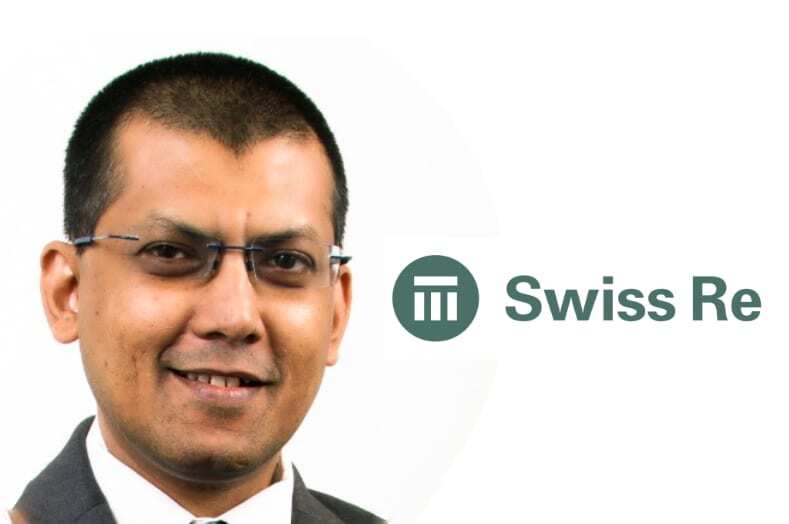Resilient economy to drive strong insurance growth in India: Amitabha Ray, Swiss Re
- October 24, 2025
- Posted by: Saumya Jain
- Category: Insurance

In a recent interview with Reinsurance News, Amitabha Ray, Market Head of India at global reinsurance giant Swiss Re, described India’s economy as resilient despite the current high consumer price inflation, with insurance sector growth above the global trend expected in the region.
Ray disclosed that total insurance premiums are projected to grow 7.1% in real terms over the next five years, well above the global average of 2.4%, emerging markets of 5.1% and advanced markets average of 1.7%.
This strong level of insurance penetration growth, according to Ray, will be driven by economic growth, an expanding middle class, and innovation, while regulatory support is also currently fuelling the expansion of the country’s insurance sector.
“Non-life premiums are forecast to grow by an annual average of 8.3% during 2024‒28 driven by improvement in the macro environment, strong distribution channels, government support, a favourable regulatory environment as well as investments in insurtech and the expanding middle-class,” said Ray.
The global reinsurer has been a player in the Indian market since 1929, setting up its first liaison office in Mumbai in 1998, and was one of the first foreign reinsurance companies to obtain a license to set up a reinsurance branch in India.
As well as robust non-life expansion, Swiss Re also expects strong growth in life business, with premiums projected to rise 6.7% over 2024‒28, supported by rising demand for term life cover by the middle-class, a younger demographic, and also increasing industry adoption of Insurtech.
As statistics suggest, over the next four years, India is expected to have the fastest-growing insurance sector among G20 countries.
This is important due to India’s large protection gap, and Swiss Re’s resilience analysis indicates that a staggering 93% of the exposures in India are uninsured.
Ray stated, “In India, multi-billion economic losses from single disaster events are now a frequent trend. Think of the large-loss flood event in Mumbai in 2005, Uttarakhand (Kedarnath) in 2013, Jammu and Kashmir in 2014, Chennai in 2015, Kerala in 2018, and Northern India in 2023.
“Swiss Re has estimated that single flood events causing economic losses of more than USD 1 billion have become more regular, there were 11 such events in 2013‒22 compared with six in 2003‒12.”
Further, recent cyclones like Hudhud (2014), Vardah (2016), Fani 2019), Taukte (2021) and Yaas (2021) caused economic losses of more than USD 2 billion, inflation-adjusted, noted Ray.
Both economic growth and urbanisation have altered the risk landscape. India’s major cities have high population- and asset-value concentrations, and many are exposed to multiple natural hazards, Ray explained.
“Climate change effects can amplify natural catastrophe risks and exacerbate floods, tropical cyclones and wildfires. There’s also a lack of awareness and low perception of risk among individuals and property owners in India.
“Inadequate risk assessment results in fragmented insurance coverage of risks for public sector infrastructure projects. Underwriting challenges, such as models and data for natural catastrophes still do not adequately flow into the insurance value chain,” said Ray.
Swiss Reinsurance Company Ltd, India Branch, began its operation on February 1st, 2017 and is one of the largest FRB (Foreign Reinsurance Branch) in India.
The reinsurer’s long-standing background helps in closing the protection gap that calls for physical risk mitigation structures to work hand-in-hand in insurance to help cushion the financial losses and strengthen India’s resilience to growing natural catastrophe risks.
The initiatives taken so far by the industry giant include the extreme heat parametric insurance cover developed in partnership with Climate Resilience for All (CRA) and the Self-Employed Women’s Association (SEWA).
“Extreme heat temperatures in India triggered insurance and cash payments in the states of Rajasthan, and Gujarat, and in 22 districts, 92% of the 50,000 women enrolled in the Women’s Climate Shock and Insurance and Livelihoods Initiative (WCS) received insurance payments,” said Ray.
In order to bridge the protection gap and boost insurance penetration in India, the regulator has a role to play, and Ray explained that the country’s government and insurance regulatory body has taken positive steps to support growth. An example is the “Insurance for all by 2047” mission, designed to ensure that every citizen and enterprise has appropriate insurance cover/solution.
“To simplify the regulatory landscape, the Insurance Regulatory and Development Authority of India has also consolidated 34 regulations into 6 regulations and also issued 2 new regulations in the spirit of ‘Ease of Doing Business’. In addition, the regulator has already initiated steps for the implementation of IFRS 17 Accounting Standards and Risk-based Capital (RBC) solvency norms in the near future,” Ray said.
Swiss Re established its Swiss Re Global Business Solutions centre (Swiss Re GBS), Bangalore, in 2000 which has grown over the last two decades and has extended its presence to Hyderabad to attract diverse skilled streams like data science, engineering, and actuaries.
Today, Swiss Re has a combined deep presence in India with more than 2200 employees working across the country to make communities more resilient.
Based in Mumbai, Ray took over as Chief Executive Officer of the Swiss Re India Branch in April, and is responsible for overseeing operations of the branch and the reinsurer’s property & casualty (P&C) business in India.
This website states: The content on this site is sourced from the internet. If there is any infringement, please contact us and we will handle it promptly.



